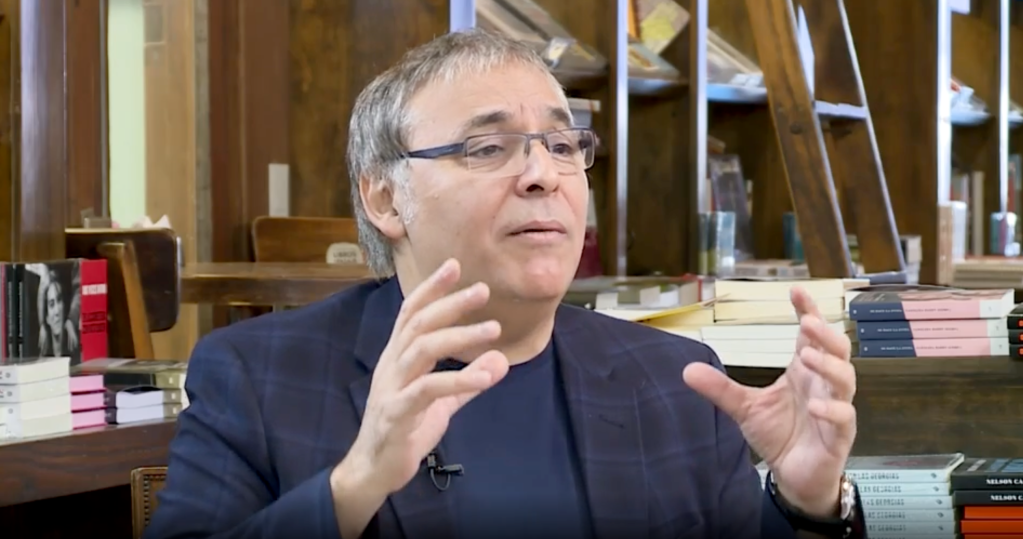Gabriel Rolón: "The human being is not a supportive being" 6:02
(CNN Spanish) --
The pandemic forced us to look inward and confronted us, in many cases, with the reality that "we are generally living a life that is not the one we want," says the renowned Argentine psychologist Gabriel Rolón.
And now, the pandemic that has not yet ended is joined by Russia's war in Ukraine.
On these and other topics, she spoke with the psychologist and writer María O'Donnell and Ernesto Tenembaum from Conecta2.
Here, some of the central ideas that the interview left and that can help to navigate this new stage.
Be careful: the isolated human being is more controllable
One of the characteristics of the pandemic has been isolation.
"Isolation destroys you, isolation takes away your notion of time and space" and "destructures" you, explains Rolón.
For this reason, he says, precisely when a prisoner wants to be punished in jail, he puts him in solitary confinement.
But now that in much of the world we are no longer forced to be isolated, however, many highlight the advantages of, for example, being able to work from home and leave the office.
"You have to be careful," says the expert, because "work has a socializing function."
"Going to work is not only that you cannot have the computer you have there at home, it is that you are forced to live with someone, to manage your humor, to be more tolerant, to exchange, to empathize with the pain of the other ", exemplified.
And his warning does not end there.
"I am concerned that all this movement will be dangerously used to isolate us even more. The isolated human being is more controllable."
And, hand in hand with this warning, comes a piece of advice.
advertising
Do not virtualize at all
Rolón believes that, despite the fact that we still do not know what life will be like in the future because the pandemic will leave its mark, there may be "an intersection between what isolation was and what life is as we conceived it before."
And, although in such a context one can, for example, work a few days from home, it is a point to reflect on.
"We have to think about it because the world moves based on human relationships and it is important not to completely virtualize ourselves."
"The idea that we are much more manageable in love on the internet and locked in our room scares me than when we get together, when we get together and when we can talk with our colleagues and say 'hey, are you satisfied with what they pay us? '
and the other tells you 'the truth is not'. 'And why don't we do something?' ", she explained.
Don't act like nothing happened
The pandemic generated anguish, an emotion that can be paralyzing.
However, says Rolón, the people he cares for are precisely trying to do something with that anguish and that is why he goes to the analyst and asks himself.
Do we have to forget the anguish?
"We must not act as if nothing had happened with this anguish. I am not saying to stay morbidly going around about the anguish, but to record something of this", says Gabriel Rolón, and addresses what this stage of history showed us about the humanity, which is perhaps very different from what we would have imagined or wanted.
Discover people who are not 'hell'
Do you remember when many voices said that we would come out of the pandemic better?
More supportive?
Rolón contrasts these postulates with reality: we are not even out of the pandemic yet and we are already immersed in a war.
"The human being is not a solidary being", he affirms.
What can we do about this?
The psychologist cites "The Invisible Cities" by the author Italo Calvino.
"Calvino has a phrase where he says something like that hell is not something that is going to be, that hell is this that we share all the time and that it is what we build together, but that we have a certain possibility, which is to discover what people and what things inside hell are not hell. And with those people try to build a little piece of personal heaven. I think that's the way".
We do well to be (and be) afraid
The world wakes up every day with new news of the horrors of a war that has been going on for almost two months.
"We do well to be afraid and above all we do well to be afraid of ourselves, to see what we human beings are capable of, the destructive power we have", and he affirms that this power is what we see in war but it is also within home and within each.
It is what Freud called the "death drive," "an internal struggle between a drive that invites him to desire and build and a drive that invites him to hurt himself, to suffer and to attack."
And what we see in a big way also exists on a personal level in that "daily war" that one has with his partner, his children and even oneself.
when to go to therapy
Perhaps at some point in your life you have wondered if you should go to therapy, what would it do for you.
Rolón affirms that, despite the fact that some people are heard saying that everyone should go to a psychologist, "analysis is not an obligation" and "the psychologist is there for someone who has a question that cannot be answered (... .) or for someone who has a pain that they cannot go through alone".
"If these conditions are not met, going to the analyst is totally in vain", he assures, since it is likely that you will go to some sessions and eventually drop out because "what sustains you is either an anguish or a question" (which sometimes, by the way, you may not know what it is).
Why is it not the same to talk to the psychologist than the friend
Does talking to another person make you think better?
Yes, as long as that person listens to you from a particular place", explains Gabriel Rolón, dismantling one of the arguments that we usually hear against therapy: "why pay a psychologist if I have friends to talk to".
The question to ask yourself, he explains, is from where your friends listen to you.
"Your friend probably loves you so much that he even agrees where you don't to make you feel better," she says.
"The friend is someone who wants your well-being" while "the analyst wants to discover your truth and that later you, with your truth, build yourself into the best person you can be".
the value of sex
Another topic addressed in the interview was sex.
Rolón says that in sex "intelligent couples have found a very important source to deal with the pandemic" because pleasure "defends you from anguish and uncertainty."
"Pleasure and anguish exclude each other," she says, so the more pleasure, the less anguish.
Why is it so usual to go to the psychologist in Argentina?
0:50
And finally: why is Buenos Aires the city with the highest number of psychoanalysts per capita?
Buenos Aires is the city with the highest number of psychoanalysts per capita in the world, confirms Gabriel Rolón.
Why?
His argument, he says, is more poetic than anything else, but he still shares it.
"Argentina is a country made of absences," he reflects, recalling how it was formed from immigrants who arrived in a "world of loneliness, anguish and loss."
"Argentina is a country created by people who were in mourning," he says, explaining that this made them close to their own pain but also to the other, that other whom you did not know but with whom you related because they all had "an anguish to tell ".
"That made us listen to each other's pain, it made us realize that we needed the word to not be so alone in the world."












/cloudfront-eu-central-1.images.arcpublishing.com/prisa/KMEYMJKESBAZBE4MRBAM4TGHIQ.jpg)


